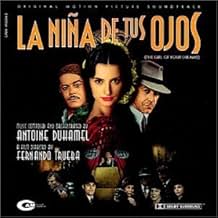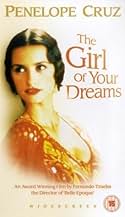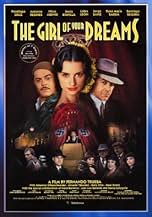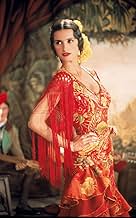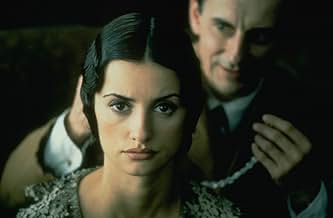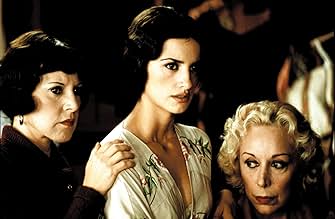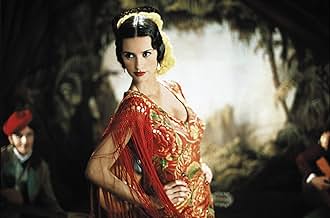IMDb-BEWERTUNG
6,7/10
4655
IHRE BEWERTUNG
Füge eine Handlung in deiner Sprache hinzuA company of Spanish movie makers leaves Franco's Spain and moves to Hitler's Germany to produce a film. Problems soon arise.A company of Spanish movie makers leaves Franco's Spain and moves to Hitler's Germany to produce a film. Problems soon arise.A company of Spanish movie makers leaves Franco's Spain and moves to Hitler's Germany to produce a film. Problems soon arise.
- Auszeichnungen
- 14 Gewinne & 16 Nominierungen insgesamt
Rosa Maria Sardà
- Rosa Rosales
- (as Rosa María Sardá)
Miroslav Táborský
- Václav
- (as Mirosláv Táborský)
Juan Luis Galiardo
- Embajador
- (as Juan Luís Galiardo)
Jan Preucil
- Maisch
- (as Jan Přeučil)
Borivoj Navrátil
- Henkel
- (as Bořivoj Navrátil)
Empfohlene Bewertungen
Penelope Cruz is so good in this movie she carries it; you really want to see what happens next. She has some great musical numbers and some excellent dramatic scenes. I also found the set design and scenery superior, as well as just the visuals who contrast the small, swarthy Spaniards against the Aryan ideal. The DVD I rented had two versions, in Castillian Spanish and Mexican Spanish, with English sub-titles, which was interesting when the characters spoke in German, as that was not translated unless a translator actually did it in the film. Actually there was even a little Russian. The supporting cast gets a little slapstick at times, but I found the film well worth it as a Cruz vehicle--she is quite a beautiful actress. 8/10.
OK, I've never been a great fan of Penelope Cruz, but I was going to take my Spanish exams two weeks before I watched this film and I thought it would be good practice. I was pleasantly surprised! The movie takes place in 1938 and shows the story of a Spanish film crew, one that is funded by Franco, which is invited by Goebels to Germany to make a Spanish and a German version of the film "La Nina De Tus Ojos" (freely translated into something like "The Girl Of Your Dreams"). And when they arrive at the studios of UFA, the mayhem begins! First of all, I would like to note that this is a great production. It's obvious that plenty of money were thrown into it, a thing that is obvious in some scenes. There are some scenes that are very funny and some characters in general make you laugh from the moment they appear on screen. Personally I will never forget that dog in the beginning! You will know when you'll see it.
Trueba's directing is very good. Although I had heard his name before, I hadn't had the chance to watch some other movie of his before this one. I will try to in the future. He managed to keep the whole thing running, never making the viewer get bored at a single moment. And well, at those moments when the plot had started getting a bit slow, he threw in Penelope Cruz's breasts! What I didn't like was the political statements this movie tried to make. They seemed completely out of place and most of them were childish. First of all, all those arguments about the Jews that Cruz's character made hardly had anything to do with what was going on at the moment and they seemed as if they were forced. In fact, I can't understand why the Jewish character was there. He is the only one among the gypsies that were brought to the studio, or at least they don't show us any more. But the Germans didn't place Jews and gypsies in the same concentration camps! Anyway... Some times it just felt as if the producers hoped that they could sell this film to Hollywood (I hope you understand the connection). And of course the way they portrayed Goebels was way too cartoonish. Of course I know this is a comedy and Goebels had indeed some very ridiculous things going on about him and, yes, he did sleep with many actresses but well, they show him way too silly most of the times...
But if you set aside the moments where the story tries to make itself look really serious, this is a good and very enjoyable film. In fact, sometimes you will be surprised by the skill Trueba shows here. Spanish cinema has been giving us many gems in the last few years and I hope it will continue this way!
Trueba's directing is very good. Although I had heard his name before, I hadn't had the chance to watch some other movie of his before this one. I will try to in the future. He managed to keep the whole thing running, never making the viewer get bored at a single moment. And well, at those moments when the plot had started getting a bit slow, he threw in Penelope Cruz's breasts! What I didn't like was the political statements this movie tried to make. They seemed completely out of place and most of them were childish. First of all, all those arguments about the Jews that Cruz's character made hardly had anything to do with what was going on at the moment and they seemed as if they were forced. In fact, I can't understand why the Jewish character was there. He is the only one among the gypsies that were brought to the studio, or at least they don't show us any more. But the Germans didn't place Jews and gypsies in the same concentration camps! Anyway... Some times it just felt as if the producers hoped that they could sell this film to Hollywood (I hope you understand the connection). And of course the way they portrayed Goebels was way too cartoonish. Of course I know this is a comedy and Goebels had indeed some very ridiculous things going on about him and, yes, he did sleep with many actresses but well, they show him way too silly most of the times...
But if you set aside the moments where the story tries to make itself look really serious, this is a good and very enjoyable film. In fact, sometimes you will be surprised by the skill Trueba shows here. Spanish cinema has been giving us many gems in the last few years and I hope it will continue this way!
The cast is excellent and the movie is quite funny and moving. Not to mention based on historical facts. (Spanish actors doing movies at the UFA studios in the thirties). The setting, the costumes and photo -brilliant. However there's one big draw back: The plot goes "Thummpph!" after an hour and suddenly becomes a French farse (people banging doors, hiding in closets and becoming hysterical) and it all falls apart. It does pick up at the end though. It's not the greatest film ever made but it's watchable. And Penelope Cruz...what can I say? She's fabulous.
This is an enjoyable and light comedy set during the Spanish Civil War and Nazi Germany . A very pleasant comedy plenty of humor , emotion , sensitive scenes and mayhem . A company of Spanish movie makers leaves Franco's Spain and moves to Hitler's Germany to make a film in co-production . During the Spanish Civil War , the troupe goes from Spain for a joint production with Nazi UFA led by Goebbles and including a filmmaker who bears remarkable resemblance to Fritz Lang . Besides the problems of any movie set , add to the tensions : a drama about Jews ; as Nazis use Jewish and Gypsy prisoners (Karel Dobry) as extras to give an Andalucian look , the director (Antonio Resines) is sleeping with his main actress named Macarena Granada (Penelope Cruz) with no intention of leaving his spouse , and Macarena cooperates with this Nazi objective in hopes of freeing her daddy from one of Franco's prison . Soon some problems start to arise when Goebbels (Johannes Silberscheneider) himself plies her with favors, the filmmaker and the rest of the crew (Jorge Sanz , Neus Asensi , Rosa Maria Sarda , Loles Leon, Santiago Segura , Jesus Bonilla) encourage her to sleep with him for the good of the filming .
This is an Award Winning picture by Fernando Trueba , the director of ¨Belle Epoque¨ . Comedy with historical background and movie troupe way-of-life elements ; adding culture and politics , including enjoyable performances and adequate set design . ¨La Niña De Tus Ojos¨ results to be other of the innumerable stories to deal with deeds regarding Spanish Civil War , but including jealousies , antics and sexual escapades , being set in Nazi Deutschland , too . A familiar theme about the global horrors of a fratricide war , impossible to forget to our cinema . Based on true events during the filming of Carmen (1938) and Nights in Andalucia (1938), both starring Imperio Argentina . An agreeable story plenty of amusing moments , moving feelings and fun finale . It is a light , wistful comedy , easy to watch , and easier to love . It is as beautifully filmed as it is written and acted . This is one of those rare gems that does not stray from its purpose - to be a celebration of love and romance - and comic tale of a company who suffers several dangers and funny situations in another country during a hectic time , including the sad ¨Kristallnachat¨, (1938), being splendidly recreated . This is an tragicomedy that blends tragic elements , humor and irony . A serious/ironic film about xenophobia , racism and Jews brutal persecution . Director Fernando Trueba , also writes the interesting script along with prestigious screenwriter Rafael Azcona , Luis Garcia Berlanga's usual and David Trueba , Fernando's brother . Filmed in his usual formal and luxurious style , without leaving a trace the joyful themes , in terms of fun and narrative excitement . Unforgettable Penelope Cruz who though plays a Folkloric player , Imperio Argentina lookalike , she parades sexily at her best and more relaxed and enticing than ever . The hit of the show is undoubtedly for the fetching Penelope who gives one of the best screen acting . Very good secondary cast formed by Spanish familiar faces such as Rosa Maria Sarda , Neus Asensi , Santiago Segura , Jesus Bonilla , Maria Barranco , Juan Luis Galiardo as the Ambassador and many others . Evocative and jolly musical score by Antoine Duhamel , including various Folkloric songs marvelously sung by Penelope Cruz . In addition , a spotless pictorial cinematography by Javier Aguirresarobe and a willingness , almost perfect of the elements of each shot , every sequence , every space ; being filmed in Prague , Czech Republic . Aguirresarobe subsequently would make a prestigious career in Hollywood such as ¨Fright night , ¨The twilight saga: eclipse¨, ¨The road¨ , ¨The others¨ and many others . The picture is entertaining and well worth your time . The film is light and never somber, no small accomplishment from Fernando Trueba and his team.
This simple, delightful motion picture was well directed by Fernando Trueba . His first success was Ópera Prima (1980) following the style of the "Madrid comedy". He had major success with Sé Infiel y No mires Quién (1985) also known as : Be Wanton and Tread No Shame , starting a longer collaboration with the producer Andrés Vicente Gómez . He went on directing numerous successes such as Coarse salt , Too Much , Milagro de Candeal , Year of Enlightment , The Girl of Your Dreams , Calle 54 , Embrujo De Shanghai , Chico and Rita and recently : The Artist and the Model . Trueba was President of the Spanish Academy of Motion Picture Arts and he received the 1994 Oscar for Best Foreign Film to Belle Epoque (1992) .
This is an Award Winning picture by Fernando Trueba , the director of ¨Belle Epoque¨ . Comedy with historical background and movie troupe way-of-life elements ; adding culture and politics , including enjoyable performances and adequate set design . ¨La Niña De Tus Ojos¨ results to be other of the innumerable stories to deal with deeds regarding Spanish Civil War , but including jealousies , antics and sexual escapades , being set in Nazi Deutschland , too . A familiar theme about the global horrors of a fratricide war , impossible to forget to our cinema . Based on true events during the filming of Carmen (1938) and Nights in Andalucia (1938), both starring Imperio Argentina . An agreeable story plenty of amusing moments , moving feelings and fun finale . It is a light , wistful comedy , easy to watch , and easier to love . It is as beautifully filmed as it is written and acted . This is one of those rare gems that does not stray from its purpose - to be a celebration of love and romance - and comic tale of a company who suffers several dangers and funny situations in another country during a hectic time , including the sad ¨Kristallnachat¨, (1938), being splendidly recreated . This is an tragicomedy that blends tragic elements , humor and irony . A serious/ironic film about xenophobia , racism and Jews brutal persecution . Director Fernando Trueba , also writes the interesting script along with prestigious screenwriter Rafael Azcona , Luis Garcia Berlanga's usual and David Trueba , Fernando's brother . Filmed in his usual formal and luxurious style , without leaving a trace the joyful themes , in terms of fun and narrative excitement . Unforgettable Penelope Cruz who though plays a Folkloric player , Imperio Argentina lookalike , she parades sexily at her best and more relaxed and enticing than ever . The hit of the show is undoubtedly for the fetching Penelope who gives one of the best screen acting . Very good secondary cast formed by Spanish familiar faces such as Rosa Maria Sarda , Neus Asensi , Santiago Segura , Jesus Bonilla , Maria Barranco , Juan Luis Galiardo as the Ambassador and many others . Evocative and jolly musical score by Antoine Duhamel , including various Folkloric songs marvelously sung by Penelope Cruz . In addition , a spotless pictorial cinematography by Javier Aguirresarobe and a willingness , almost perfect of the elements of each shot , every sequence , every space ; being filmed in Prague , Czech Republic . Aguirresarobe subsequently would make a prestigious career in Hollywood such as ¨Fright night , ¨The twilight saga: eclipse¨, ¨The road¨ , ¨The others¨ and many others . The picture is entertaining and well worth your time . The film is light and never somber, no small accomplishment from Fernando Trueba and his team.
This simple, delightful motion picture was well directed by Fernando Trueba . His first success was Ópera Prima (1980) following the style of the "Madrid comedy". He had major success with Sé Infiel y No mires Quién (1985) also known as : Be Wanton and Tread No Shame , starting a longer collaboration with the producer Andrés Vicente Gómez . He went on directing numerous successes such as Coarse salt , Too Much , Milagro de Candeal , Year of Enlightment , The Girl of Your Dreams , Calle 54 , Embrujo De Shanghai , Chico and Rita and recently : The Artist and the Model . Trueba was President of the Spanish Academy of Motion Picture Arts and he received the 1994 Oscar for Best Foreign Film to Belle Epoque (1992) .
Without trying to offend anybody I have to agree with another reviewer in that an explanation for the bad reception of this film among the non-Spanish speakers reviewers was exactly that: Spanish is not their first language and this is sometimes, as another reviewer has pointed out, a difficult film to understand if you are not a native speaker. A full understanding of the dialogue would help to clarify some of the bizarre scenes in the film. It might not be the best script written by Rafael Azcona, without any doubt one of the best scriptwriters in the history of Spanish cinema, but at times it is hilarious. A better grasp of Spanish history and culture would also come quite handy. So what else can you say about Penelope Cruz in the scene where she dances and sings for Goebbels?. As one her shoe is missing, she unintentionally imitates Goebbles, as she approaches him in a frontal shot, who is lame.
Jokes on the Spanish fascist are more than just clichés. For example the cuckold Spanish ambassador played by Juan Luis Galiardo and his nymphomaniac wife, played by Maria Barranco. And the wisecracking remark made by the pro-fascist Spanish troupe leading man, Jorge Sanz, wooded by his German counterpart "Yo doy todo por mi patria menos mi culo", he would give anything for his country except his ass. They are both an amusing pisstaking on fascist patriotic macho culture. This subject of patriotism being a hot issue right now in Spain where the right-wing government of Aznar is endorsing the notion of "Patriotismo Constitucional" or Constitutional Patriotism developed by the German philosopher Jürgen Habermas. Unashamedly, the film upholds the necessity to produce espanoladas. As the film director Blas Fontiveros, played by Antonio Resines, remarks that the life of a Spanish hero has more relevance to Spanish audiences, as they feel more identified, than for example Al Capone's. 5 Spanish (espanoladas) films were, in fact, made in Nazi Germany. Two starred by Imperio Argentina and another 2 by Estrellita Castro both stars of the "cine folclorico espanol".
As already remarked by some reviewers the film copies scenes from other films, the most obvious being its final sequence, which is a rip off of the end of Casablanca, but to suggest that it is a carbon copy of such and such a film is pure overstatement and a rather facile critique of the film. Yet its politics are not at all convincing, not to say rather naïve. The introduction of the Russian Jewish character signals the fall of the film into sentimental humanism and vacuous romantic trifle from where the film does not recover. Nevertheless La Nina de tus Ojos has its charms too and I found it extremely funny. The cast is excellent (Penelope Cruz playing an andalusian, a role she had already done in Almodovar's "Todo Sobre mi Madre" as a prostitute). Resines and Sanz are a surprise as well as Santiago Segura. But special mention deserves Miroslav Táborský, playing Vaclav the interpreter. Subtle looks at Macarena tell of his unrequited love for her. His increasing fascination with Macarena moves him away from his non-interventionist stand to resignedly accept his fate by the end of the film, along with Fontiveros who is Macarena's lover, at the hands of the Nazi. Yet this is never overdone as the change of views underwent by the other characters towards the Nazi regime, in particular the case of Julian Torralba. This little subplot of the film is quite moving rather sentimental and its quiet essence contrast sharply with the bombardment of dialogue coming from the rest of the cast.
Jokes on the Spanish fascist are more than just clichés. For example the cuckold Spanish ambassador played by Juan Luis Galiardo and his nymphomaniac wife, played by Maria Barranco. And the wisecracking remark made by the pro-fascist Spanish troupe leading man, Jorge Sanz, wooded by his German counterpart "Yo doy todo por mi patria menos mi culo", he would give anything for his country except his ass. They are both an amusing pisstaking on fascist patriotic macho culture. This subject of patriotism being a hot issue right now in Spain where the right-wing government of Aznar is endorsing the notion of "Patriotismo Constitucional" or Constitutional Patriotism developed by the German philosopher Jürgen Habermas. Unashamedly, the film upholds the necessity to produce espanoladas. As the film director Blas Fontiveros, played by Antonio Resines, remarks that the life of a Spanish hero has more relevance to Spanish audiences, as they feel more identified, than for example Al Capone's. 5 Spanish (espanoladas) films were, in fact, made in Nazi Germany. Two starred by Imperio Argentina and another 2 by Estrellita Castro both stars of the "cine folclorico espanol".
As already remarked by some reviewers the film copies scenes from other films, the most obvious being its final sequence, which is a rip off of the end of Casablanca, but to suggest that it is a carbon copy of such and such a film is pure overstatement and a rather facile critique of the film. Yet its politics are not at all convincing, not to say rather naïve. The introduction of the Russian Jewish character signals the fall of the film into sentimental humanism and vacuous romantic trifle from where the film does not recover. Nevertheless La Nina de tus Ojos has its charms too and I found it extremely funny. The cast is excellent (Penelope Cruz playing an andalusian, a role she had already done in Almodovar's "Todo Sobre mi Madre" as a prostitute). Resines and Sanz are a surprise as well as Santiago Segura. But special mention deserves Miroslav Táborský, playing Vaclav the interpreter. Subtle looks at Macarena tell of his unrequited love for her. His increasing fascination with Macarena moves him away from his non-interventionist stand to resignedly accept his fate by the end of the film, along with Fontiveros who is Macarena's lover, at the hands of the Nazi. Yet this is never overdone as the change of views underwent by the other characters towards the Nazi regime, in particular the case of Julian Torralba. This little subplot of the film is quite moving rather sentimental and its quiet essence contrast sharply with the bombardment of dialogue coming from the rest of the cast.
Wusstest du schon
- WissenswertesWhile fictional, the film is strongly inspired by the production of the films Carmen (la de Triana) (1938) and Andalusische Nächte (1938), two versions of the same story shot simultaneously in Berlin, one in Spanish and one in German, both starring Imperio Argentina.
- Crazy CreditsThe entire credits are at the start of the film, with the end credits just recapping the main cast, with the other actors not listed alongside the character they play.
- VerbindungenFeatured in Cinemania: I anodos kai i ptosi tou Nazismou (2008)
- SoundtracksLos piconeros
Written by Juan Mostazo and Ramón Perelló
Orchestrated by Antoine Duhamel
Performed by Arabia Martín
Top-Auswahl
Melde dich zum Bewerten an und greife auf die Watchlist für personalisierte Empfehlungen zu.
- How long is The Girl of Your Dreams?Powered by Alexa
Details
- Erscheinungsdatum
- Herkunftsland
- Offizielle Standorte
- Sprachen
- Auch bekannt als
- The Girl of Your Dreams
- Drehorte
- Produktionsfirmen
- Weitere beteiligte Unternehmen bei IMDbPro anzeigen
Box Office
- Budget
- 4.200.000 € (geschätzt)
Zu dieser Seite beitragen
Bearbeitung vorschlagen oder fehlenden Inhalt hinzufügen

